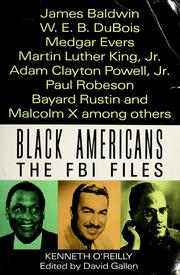Check nearby libraries
Buy this book

"Racial Matters" - as they were designated by the Federal Bureau of Investigation - preoccupied the FBI and its director, J. Edgar Hoover, from the outset. In postwar America, however, as the Bureau's director became increasingly more obsessed with the so-called "Communist threat," in the mind of the FBI racial matters became linked more and more to national security matters.
From the Black Muslims in the thirties to the Black Panthers three decades later the FBI files on African Americans, their political affiliations, their social activities, their public enemies and private friends, grew to voluminous proportions.
The civil rights movement challenged the status quo. For Hoover that in itself justified FBI surveillance of such black activists as labor organizer A. Philip Randolph, leftist agitator Bayard Rustin, Medgar Evers and Roy Wilkins of the NAACP, the charismatic Martin Luther King, Jr., and the fiery Malcolm X. The freewheeling U.S. Congressman from Harlem, Adam Clayton Powell, Jr., failed to escape the eye of America's national watchdog. So did ideologues like Marcus Garvey and W. E. B.
Du Bois, as did the celebrated singer-actor Paul Robeson. The FBI files on these ten African Americans alone total more than 35,000 pages
- Excerpts from audiotape transcripts, field reports, interviews, wiretaps, Bureau memos, and official directives in the files of these African Americans reveal both the focus and the scope of the agency's surveillance. Stamped "secret" or "confidential," uncensored and indiscreet, the information in these files ultimately reveals as much about the political and racial biases of the Bureau and its director as it does about the subjects themselves.
Commentary by civil rights historian Kenneth O'Reilly throughout Black Americans: The FBI Files places the activities of the Bureau's agents and their subjects in a social and political context that illuminates more fully the significance of this dark chapter in modern African American history.
Check nearby libraries
Buy this book

Previews available in: English
Showing 1 featured edition. View all 1 editions?
| Edition | Availability |
|---|---|
|
1
Black Americans: the FBI files
1994, Carroll & Graf
in English
- 1st Carroll & Graf ed.
0786700106 9780786700103
|
aaaa
Libraries near you:
WorldCat
|
Book Details
Edition Notes
Includes index.
Classifications
The Physical Object
ID Numbers
Community Reviews (0)
Feedback?| July 24, 2024 | Edited by MARC Bot | import existing book |
| October 8, 2021 | Edited by ImportBot | import existing book |
| February 13, 2020 | Edited by MARC Bot | remove fake subjects |
| May 19, 2019 | Edited by MARC Bot | import existing book |
| December 10, 2009 | Created by WorkBot | add works page |













